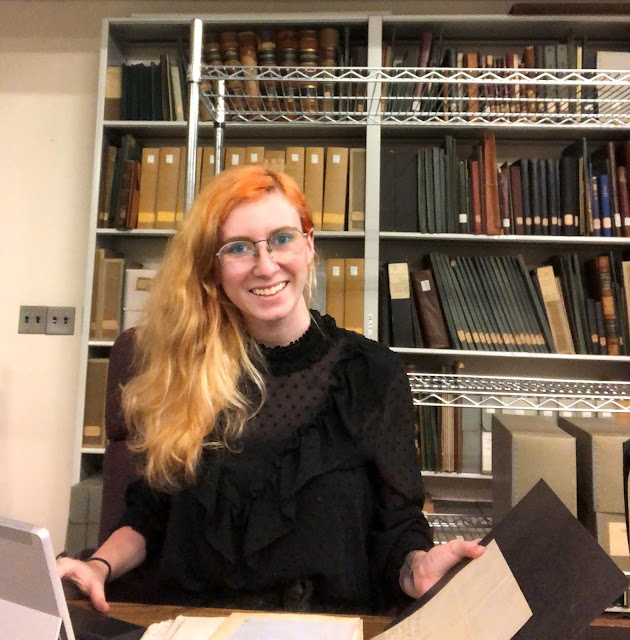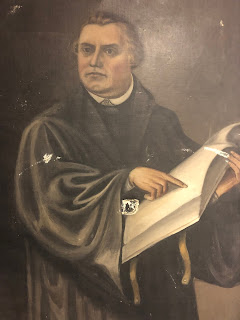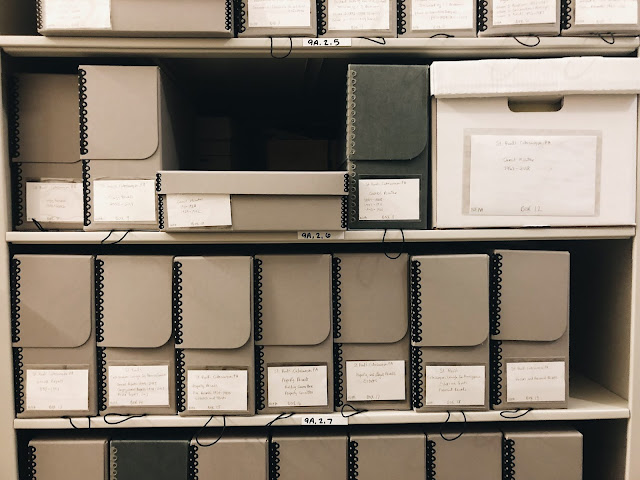What Does a Project Archivist Do? | Meet Melissa Bergoffen
Have you ever heard of a project archivist? What does that mean and what do they do? In today's post we will be diving into this topic and introduce you to our very own Project Archivist, Melissa Bergoffen!
How did you find your way to the Lutheran Archives Center?
Initially, I was introduced to the Lutheran Archives Center in 2017, when the director of LACAP and also my internship employer/supervisor through Historic Trappe, Lisa Minardi, brought me along to archives to help with a day-long reorganization project. Before that, I hadn’t really worked in an archive, at least outside of my classes. Then, this past summer, Lisa contacted me saying that LACAP had received a grant that would fund a project archivist to work with cataloging and organizing the MOP collection, and if I might be interested in applying for it. I definitely was, as my then job was not necessarily what I envisioned doing professionally. So I was interviewed by Sheila, LACAP’s archivist, and I was lucky enough to get the job!
Are you from Pennsylvania?
Originally, I was born in Queens, New York, but I’ve spent most of my childhood and teenage years in northeastern PA. And I seem to keep returning to Pennsylvania; I’d come home during my winter breaks from undergrad, I’d dig in Trappe during my summers, and then I worked in PA after graduating from my master’s program. When I was younger, I admittedly didn’t think I’d stay here, but from my experiences leaving PA, I miss the mountains and forests of my hometown, and the rich history that I’ve found in and around Philly.
Where did you learn the skills to become a Project Archivist?
A lot of the skills necessary for this position as a project archivist I learned while at Pratt Institute, where I was getting a master’s of science in Library and Information Science. While there, I took two classes that really helped me learn how to manage and handle archival and rare book collections: Management of Archives and Special Collections, as well as Rare Books and Special Collections. These two classes not only gave theoretical knowledge on how to organize the kind of collections I’m working with today, but also gave practical experience. And I think the latter really prepared me for this type of position. Additionally, my other courses were useful, because they taught me things like how to navigate and edit databases, how to handle and preserve these types of materials, and more about the administrative side of the job.
 |
| Melissa and her cart full of records to be inventoried. |
What do you do as a Project Archivist? Can you tell us what a project archivist is?
While Sheila pretty much oversees all collections held by LACAP and has various responsibilities, I, as a project archivist, am focused on one collection: the MOP collection. I pretty much go shelf by shelf within the collection, recording in a spreadsheet important information about each bibliographic item (title, date, measurements, contents, etc.) that will eventually be uploaded to PastPerfect, which will then allow the public to browse the collection (like a library’s online catalog). I also take pictures of the items so that way, when accessible online, you’re not just seeing a bunch of text, but also what the item looks like. While recording this information, I’m also assessing the condition of each item, like whether it is moldy or needs a more archivally safe container, as well as removing things like paper clips, staples and rubber bands. And finally, my position also includes outreach through social media and blog posts.
 |
| One of the shelves of the Ministerium of Pennsylvania Collection that Melissa has completed inventorying (with many more to go!) |
What are your career goals? Do you aspire to work in an archives?
While I thoroughly enjoy this current position, my dream job is to return to Classical Archaeology, which was my major in undergrad. I’d love to spend most of my time excavating in Greece and working with ancient Greek artifacts, specifically ceramics, in a museum, but for the rest of my professional time, I could see myself continuing to do archival work as more of a part-time job. This position, though in a different field than my dream jobs, has given me so many transferable skills that will help me in the long run, and I truly appreciate it. For one, it has allowed me to catalog and handle older, rare materials (though bibliographic in nature), which can only help in cataloging and handling artifacts in the future. Also, it’s helped me perform research in a short period of time on subjects I’m not as familiar with, which could be helpful for potential exhibits I could work on. Finally, and this is something I had not expected, it has helped me in engaging with our audience through social media and blog posts, which is pretty much a necessity nowadays for any non-profit organization.
 |
| Melissa works at her desk inventorying the MOP collection. |
How do you enjoy spending your time outside of the archives?
Outside of the archives, I pretty much spend my time reading fantasy and science fiction books or watching tv shows and movies (especially anything Marvel related) because, if you couldn’t tell already by the enjoyment I have for this position, I’m a bit nerdy. Because I’m also trying to get into graduate programs for Classical Archaeology, I’ve been taking a lot of language courses (right now I’m taking Latin, previously I took ancient Greek, I hope to continue teaching myself modern Greek, and I hope to take German next semester) and am gathering my materials to apply. In normal times, I loved going to the movies, traveling, and visiting museums and libraries.
What tips or advice do you have for aspiring archivists who are interested in applying to project archivist positions?
While I don’t feel qualified to give advice, as I’ve only just begun working in the archival field (and suffer a little bit from imposter syndrome), I think the most important piece of advice I can give is to network. Now I know that sounds like an eye-rolling answer that is not specific for archives, or might be intimidating, but it’s the truth. I probably wouldn’t have even heard about this position if I had not known the director beforehand. And I feel like in this kind of field, knowing people is very beneficial. Now I also completely understand how intimidating and anxiety-inducing it is to network; believe me, I’m a serious introvert who stresses and struggles with meeting new people, especially in professional situations. But if I can do it, you definitely can! I’d recommend starting by doing informational interviews with people in the field, maybe at institutions where you dream of working at, to get information about their path to their current position. Then maybe follow different organizations (looking at the Society of American Archivists is a great place to start) to see if there are any social gatherings that you could attend and meet local people who work in the field. Otherwise, once you get into the field, you can learn all of the skills necessary on the job, so I don’t think getting a master’s in library and information science is crucial before you get a job (though it can definitely help out with networking, and can give you a little bit of an edge because you will already have the theoretical and some practical knowledge about archival standards and such).



Comments
Post a Comment